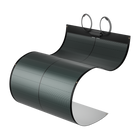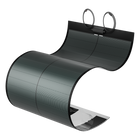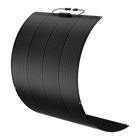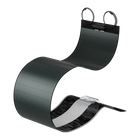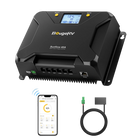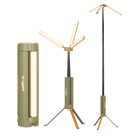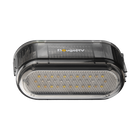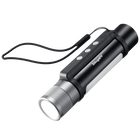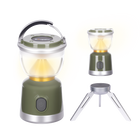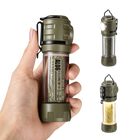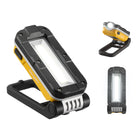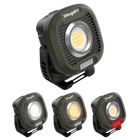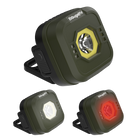What Size Generator To Run A House- Choose The Right Size!


Let’s face the facts: electrical blackouts are becoming more common across the United States. An aging electrical grid and a changing climate mean that thousands of people will be left without power at any given time. A good solar generator can be a game-changer, but you need the right equipment to get the results you want.
At BougeRV.com, we have years of experience planning for off-grid situations, and in this article, we will teach you how to choose the right size generator to run an entire house. Drawing on our expertise, we will also give you some tips on how to use a solar generator around the house even when the power is on.
What Is A Solar Generator For A House?

A solar generator collects infrared energy from sunlight and converts it to power that is stored in a rechargeable battery pack. Many new homes being built today include solar power systems that are capable of completely offsetting the demand the home puts on the grid.
These are large and expensive systems that require professional installation and electrical work and should not be attempted by the DIYer. When the power goes out, these systems are offline, too. A whole home solar system does not function as a backup system.
A portable solar power generator with the capacity to keep appliances you need operating when the power is out can make power outages easier to handle. Portable solar generators have limits that can restrict which appliances you run and for how long. Picking the right one means you will need to decide what you want to power with it and for how long you will need power.
Can Solar Generators Run The Whole House?
In theory, a solar generator can power an entire home, depending on the battery capacity, solar power panel efficiency, and the rate at which the generator can recharge.
In practice, portable generators are simply too small to run everything in your home, and may only be able to run certain appliances for a short time. The higher the power demands of your home, the more capacity you will need from the battery backup.
What Size Generator Do I Need For My House?
People buy battery backup generators for a lot of reasons. We sell quite a few that are destined to be used in RVs headed off the grid for days at a time and a number of our products are used by emergency crews and search-and-rescue teams to provide emergency power.
Increasingly, our customers are contacting us asking about whole-home backup solutions. Let’s discuss some realities and then we will show you how BougeRV.com can help you overcome limits to powering your home with portable solar generators.
What Do You Actually Need To Power?
Blackouts can happen for many reasons. In places like California and Texas where the temperature often exceeds 110 degrees, power failures happen because of an overloaded grid, but it is rarely out for more than a few hours.
In the mid-west, tornado damage can cut power to entire communities, sometimes for days or even weeks. Areas of the country exposed to natural disasters like wildfires and hurricanes may be without power for months at a time.
Depending on the situation, you will want to have an appropriate backup in place. Short interruptions in power can be solved easily with lower-wattage generators and basic solar panels. Long-term power outage situations may require larger battery backups, more numerous and high-quality solar panels, or the use of multiple generators to supply the power you need.
The other part is powering devices you might need versus things you simply want. For example, powering an air conditioning unit or a refrigerator is going to require a lot of power and a substantial solar array to keep the battery charged. Charging a cell phone or powering an internet modem requires much less energy.
Figuring Out How Much Power I Need

We have an easy-to-use energy calculator tool that can make it much easier to estimate the amount of energy you will need to power an appliance. The wattage calculator will add up the total amount of power you will require based on the average appliance values.
Or, you can go to EnergyElephant.org to work out your energy need. You will also find an extensive chart on the site detailing specific appliances and common power requirements.
Keep in mind that appliances become less efficient as they age and will require more power than newer models.
Choosing The Right Generator: The Basics
Lots of customers come to us searching for the perfect solar power battery backup solution for their home or recreational vehicle. That’s because we are the experts in the field, and our reputation for providing durable and high-quality power solutions is legendary. What we find most often is that people don’t have a good idea of how much power they need, making it impossible to determine what solar generator will work.
Unfortunately, many people shop based on price rather than functionality, only to realize that when they need the generator, it isn’t powerful enough. To make matters worse, many internet sources will tell you unhelpful things like; “a house needs 5,000 to 7,500 watts to run,” which may be true, but no two houses are alike and there is a lot more that goes into choosing the right product than total wattage.
Determining the right solution for your home can require a substantial amount of math, so we put together some helpful guides that will make understanding the amount of power you require much more simple. We will also share the formula you’ll need to figure out exactly what appliances you can power and for how long.
First, we want to briefly explain some of the terms used to describe the capabilities of solar power backup generators before we start talking about how to pick the right portable battery backup product for your needs.
Common Appliances And Whether A Solar Generator Will Work
There are a few terms that are used when discussing appliances and how to power them with generators. The most important ones are: Starting Wattage, Running Wattage, and Volt/Amps to Watts.
-
Starting Wattage: This number refers to the number of watts required to start an appliance. Appliances like light bulbs and space heaters are passive and appliances such as dishwashers and blenders are active wattage users. This means that some appliances will require much more power to start than they require to run.
-
Running Wattage: All appliances require some amount of wattage to run continuously. Generally, active appliances require more power to start than they do to run, while passive appliances use the same amount of wattage to run as they do to start.
-
Volts/Amps to Watts: A general way to get a rough estimate of the power demands of an appliance is to divide the available volts by the required amps. This will give you the wattage of the appliance.
This is only an estimate and is typically on the high side of actual wattage requirements, but specialized equipment and complex math is needed to determine actual wattage versus estimated wattage. Most appliances provide the watts and amps information on a tag that includes the make and model number as well as the serial number of the appliance.
Starting And Running Wattages Of Common Appliances
|
Appliance |
Starting Wattage |
Running Wattage |
Runtime with 1100wH/50aH Generator/2000w peak |
|
Curling Iron |
1500w |
1500w |
40 minutes |
|
Electric Razor |
20w |
15w |
50 hours |
|
Hair Dryer |
1250w |
1250w |
48 minutes |
|
Vacuum Cleaner |
1500w |
1000w |
1 hour |
|
Circular Saw |
2300w |
1400w |
N/A Exceeds Peak Wattage |
|
Welder |
2500w |
2000w |
N/A Exceeds Peak Wattage |
|
55" LED TV |
90w |
90w |
11 hours |
|
WiFi Router |
15w |
5w |
200 hours |
|
Cell Phone & Charger |
25w |
25w |
40 hours |
|
Blender |
800w |
500w |
2 hours |
|
Chest Freezer |
900w |
450w |
2 hours |
|
Electric Stove |
2100w |
2100w |
N/A Exceeds Peak Wattage |
|
Refrigerator |
2200w |
700w |
N/A Exceeds Peak Wattage |
|
Electric Clothes Dryer |
6750w |
5400w |
N/A Exceeds Peak Wattage |
|
Well Water Pump |
1600w |
750w |
1 hour |
Factors That Impact Runtime
The above numbers are under ideal conditions. You can clearly see how a portable generator could quickly become overwhelmed trying to power many common appliances.
Other factors can lead to even shorter runtimes. For example, the number of people in your household using power at any one time, the age and condition of appliances, and the efficiency of the power generator all make a difference.
Generator Size Needed For A Blackout

What we recommend to people who are looking for a whole-home solution in a portable package is to check out some of the various portable power stations we offer.
One of the best ways to overcome the limitations of solar generators is to purchase the largest capacity you can find. Or, you might want to use several solar generators to power numerous lower-demand devices without drawing power from one unit.
Best Solar Generator For Home Backup: BougeRV FORT 1500 Portable Generator

The Fort 1500 is a gargantuan power station solution that has enough capacity to power a full-size refrigerator and run nearly any common appliance you need.
The Fort 1500 offers 1,456wH. It features advanced MPPT solar charging technology that pairs with our convenient solar panels for rapid recharging in as little as 3.8 hours. It features a LiFePO4 battery for long service life and advanced safety features.
The Fort 1500 can power USB-A, USB-AQC, and USB-C devices and up to three 120v AC appliances. Alongside being used as a home backup, a port for 12v power also allows you the convenience of powering a camping refrigerator or other appliances.
BougeRV FORT 1000 Portable Generator For Home

The Fort 1000 is the little brother to our top-ranking Fort 1500 and includes many of the same features, including the reliable LiFePO4 battery and the built-in MPPT solar charger.
Molded grab handles make it easy to move and the brand-new LED display is simple to understand and highly visible. With 1,120WH on board, the Fort 1000 is adventure-ready and perfectly capable of running vital home small appliances including CPAP machines. It is also an ideal companion for RVing and off-grid camping while providing enough power to see you through most emergencies.
BougeRV NCM 1100Wh Portable Generator For Home

The NCM 1100Wh portable generator is a workhorse design that is built around the concept that a portable generator needs to be ready when you need it. The lithium-ion battery charges quickly and holds a charge for months.
It features three 120v AC plugs, fast charging for both USB-a and USB-C devices, and 12v power. It can recharge in as little as 4.5 hours with optional solar panels. The NCM 1100wH generator is ideal for short-term blackout situations and as emergency power. It also makes for the ideal power supply station at tailgate parties, barbecues, and picnics.
Why Do You Need A Solar Generator To Power A House?
A solar generator can serve as a vital backup power supply during emergencies to power gadgets and appliances you depend on. Whether it is a CPAP machine that might save your life or a space heater that might keep you from getting sick, a solar power station offers many useful benefits.
When there is no emergency, your solar generator can power things like a movie projector so you can show a film outside. They work wonderfully for charging cell phones, tablets, and drone batteries when you are away from a power source.
Adding solar charging to your rechargeable power backup system gives even more flexibility and opens up the possibilities of using tools you never thought you could in places that you never have been able to before.
Conclusion
A solar power generator can’t replace your grid electricity completely, but it can be important and useful when power outages occur. The solar power stations that BougeRV.com provides have all met the strictest quality and reliability standards to ensure that our customers get the best quality products available.
If you are looking for a way to keep your house comfortable during a blackout, look no further than the solutions from BougeRV.com.
FAQs
1. What size solar generator do I need to run a full-size refrigerator?
Many portable generators say they can run a full-size fridge, but most can’t start one. Our Fort 1500 power station can start that refrigerator and keep it running.
2. What will a 1000-watt solar generator run?
A 1000-watt solar generator will power most common household appliances including things like a television and a modem, floor fans, and 12v electric coolers.
Our NCM 1100 solar generator is ideal for short-term emergencies and on-demand power. The Fort 1000 offers comparable power but includes a safer LiFePO4 battery system.
3. What can you run on a 2000-watt solar generator?
A solar generator with a runtime output of 2,000 watts will power just about any appliance you can find. Some high-energy use appliances like central air conditioning may not function, even with this astronomical amount of power.
4. How many years does a solar generator last?
Portable solar generators have a lifespan of around 20 years, which is significantly longer than other types of portable generators. This long lifespan is because portable solar generators do not have any moving parts, which reduces wear and tear.
Usually, a quality solar generator can last up to 20 years with proper maintenance. It’s worthwhile to invest in the home and outdoors. However, the exact solar generator's lifespan can be impacted by different factors, such as the quality, the frequency of usage, and the maintenance of the device.
5. Is it worth getting a solar generator?
Yes. Solar generators are excellent used for running devices and powering small appliances. They're a useful power source of backup power for boating, RV camping trips, and running household appliances because of their portability.
And they're sustainable and don't needs fuel as you can recharge them with solar panels.
Moreover, by using your stored electricity during peak hours when electricity is at its most expensive, you can save on electricity bills.

















